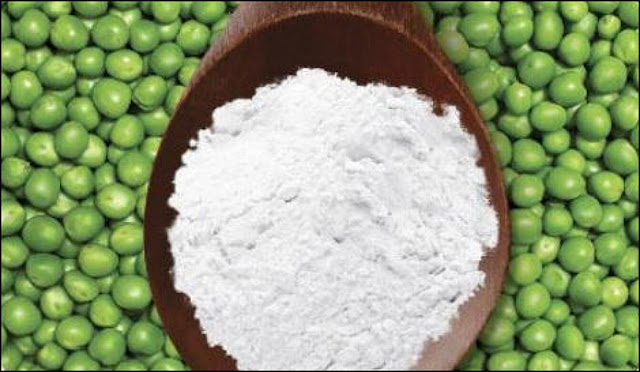Pea Starch: An Underutilized Ingredient with Multiple Uses
 |
| Pea Starch |
Pea starch is a carbohydrate extracted from yellow
peas. It has a powder-like consistency and off-white color similar to
cornstarch. Pea starch provides benefits as a plant-based ingredient and has
applications across multiple industries from food to personal care.
Chemical Composition
Pea
Starch is composed primarily of two polymers - amylose and amylopectin.
Amylose molecules form straight chain structures while amylopectin branch out.
Pea starch contains around 25% amylose and 75% amylopectin. This ratio influences
its textural properties. Pea starch granules also contain small amounts of
protein, lipid and minerals. Its amylose content is slightly higher than
cornstarch providing different functional attributes.
Physical Properties
At room temperature pea starch displays properties similar to cornstarch but
has some key differences. It has a higher swelling power absorbing more water.
Pea starch forms a stronger gel with a higher viscosity compared to cornstarch.
Its paste is more stable and resistant to shearing forces. These properties
make pea starch suitable for applications requiring thickening or water
retention. Its gelling ability plays an important role in many food
formulations.
Uses in Food Industry
As a plant-based thickening and gelling agent, pea starch finds wide usage in
sauces, soups, dressings, baked goods and other packaged foods. Its
applications in the food industry include:
- Sauces and Gravies: Pea starch is used to thicken sauces without altering
flavor. It prevents sauces from becoming gritty.
- Soups: It provides a smooth, creamy texture to soup bases while allowing
flavors to shine through.
- Dressings: In salad dressings, pea starch acts as an emulsifier preventing
oil and water from separating.
- Baked Goods: It improves volume and softness in cakes, pancakes, waffles
while extending shelf life.
- Meat Products: Pea starch coatings for meats lock in moisture and enhance
tenderness during cooking.
- Snack Foods: It provides crispiness to coated snack foods without using modified
starches.
- Packaged Foods: As a stabilizer, thickener and pre-gelatinized starch, pea
starch extends shelf life of packaged foods.
Personal Care Applications
Pea starch also finds applications as a plant-based ingredient in personal care
products due to its adsorptive properties. Some uses include:
- Talcum Powder: It absorbs moisture keeping skin dry without using talc.
- Face Powder: Pea starch acts as an absorbent to control oil and shine for a
matte finish.
- Body Powder: It effectively absorbs sweat maintaining hygiene.
- Toothpaste: Pea starch contributes to smooth texture and acts as an abrasive
for dental hygiene.
- Sunscreen: It adsorbs UV light enhancing sun protection in mineral based
formulas.
- Deodorant: Pea starch control wetness and odor better than other plant-based
ingredients.
Industrial Applications
The film forming ability, viscosity development and binding properties of pea
starch make it useful for various industrial applications:
- Paper Industry: It modifies paper texture, strength and print quality as a
binder in paper coatings.
- Textiles: Pea starch is used as a stiffening, sizing and binding agent during
fabric manufacturing.
- Pharmaceuticals: It acts as a disintegrant and binder in tablet and capsule
formulations.
- Construction: Starch adhesives containing pea starch are used to bind various
construction materials.
Advantages of Pea Starch
Compared to other starches, pea starch offers the advantages of being non-GMO,
hypoallergenic, vegan and sustainable. Its production requires less energy and
resources compared to corn or potato starches. Pea starch has potential for
wider usage as a plant-based alternative and value-added product from legume
crops. Further research into new applications will help in commercial
development and utilization of pea starch.
With unique functional properties, pea starch has multiple uses across food,
personal care and industrial sectors. As a sustainable and plant-based
ingredient, pea starch provides formulating advantages over other starches. Its
applications are still under development with potential for further growth.
Increased application of pea starch can boost agriculture industry and support
plant-based product development.
Get
more insights on this topic: Pea
Starch



Comments
Post a Comment